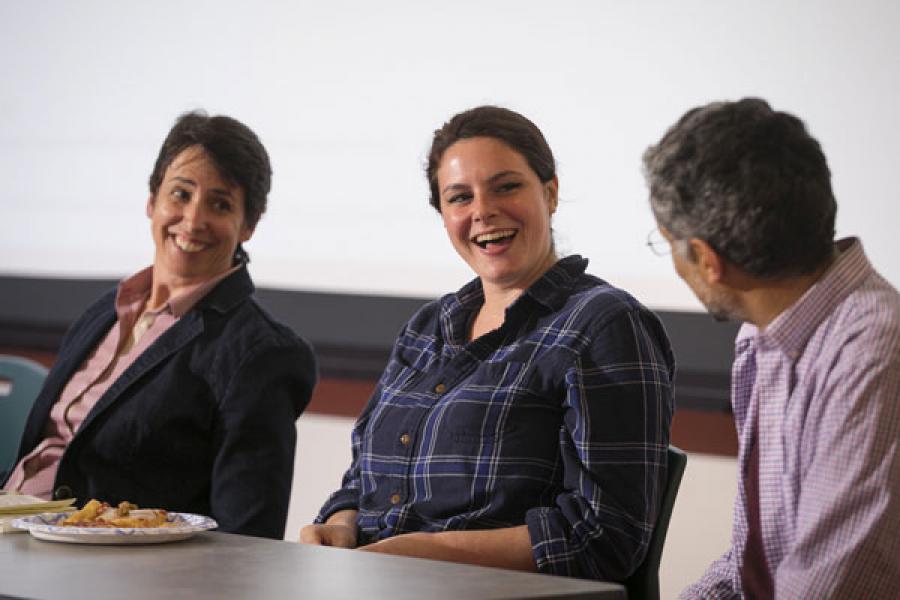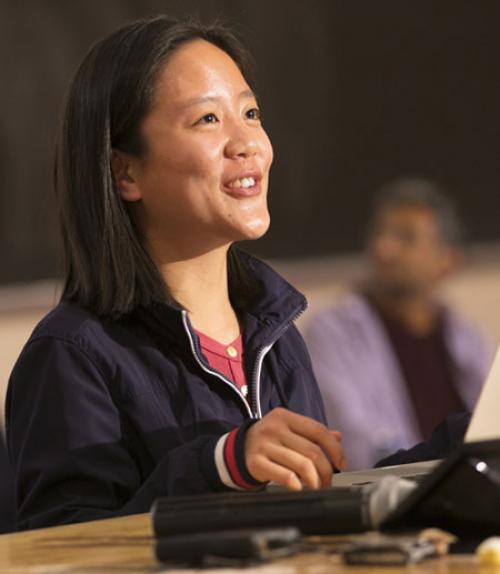Students offered feedback and asked questions about the College of Arts & Sciences’ proposed curriculum changes at a student-led forum in Uris Hall auditorium April 19. Student members of the Arts and Sciences’ Dean’s Student Advisory Council began by outlining the draft proposal, then opened the floor to a Q&A with members of the Curriculum Committee, including Madeline Gerrick ’17 and faculty members Tom Pepinsky, Kim Weeden and Ravi Ramakrishna.
Gauri Misra ’19 gave an overview of how the proposed curriculum differs, including the proposed switch from distribution requirements to “modes of inquiry” (humanistic, social and behavioral, scientific, mathematical and quantitative reasoning, and interdisciplinary exploration); the elimination of elective requirements; and the inclusion of foundational courses.
Mary Hager ’19 explained that the language requirements would remain the same, except that there would no longer be a language requirement for study abroad and that “language” would mean any living or extinct human language, including sign language, that is taught beyond the second semester at Cornell.
Eunie Yiu ’20 noted that the First-Year Writing Seminars (FWS) would not change, but that new writing-intensive courses would be piloted in conjunction with the foundational courses.
Nadia Bon ’19 described the addition of a third breadth requirement to the current geographic and historic breadth requirements: “human difference” would address class, race, nation, ethnicity, gender, sexuality and ability.
Gerrick said the reason for examining the curriculum “is to make it more possible for students to explore beyond their own major and to facilitate and empower students to explore by giving them structure and autonomy.”
Panelists Kim Weeden, Madeline Gerrick ‘17, and Ravi Ramakrishna answering questions during the forum
Added Pepinsky, associate professor of government and chair of the Curriculum Committee, “One of our guiding principles in development of this proposal is simplicity. We want students to clearly understand how the curriculum is structured and why these requirements exist.”
Many questions raised during the Q&A focused on the foundational courses. Panelists explained that foundational courses are not a new concept; many departments and programs already offer broad introductory courses in their disciplines that also introduce students to different modes of inquiry. Some departments without such foundational courses are excited to innovate along these lines and bring in modes of inquiry that draw on different disciplines, noted Pepinsky, adding that many faculty members have expressed enthusiasm about making space in the curriculum for courses that would be cross-listed across disciplines and even colleges.
“Foundational courses are a pilot proposal,” said Weeden, chair of sociology and the Jan Rock Zubrow ’77 Professor of the Social Sciences. “We want to encourage faculty to develop them and see how they go. Under the first draft of the proposal, we’d vote in several years, after collecting data on the pilot, on whether to require foundational courses.”
Some concerns raised by students have also been raised by faculty, noted the committee members, such as whether the distribution requirements would have to be fulfilled by foundational courses. Pepinsky emphasized that the current proposal is a draft and will undergo revision based on feedback from students and faculty.
Students offered varying perspectives on the First-Year Writing Seminars and the proposed addition of new writing classes tied to the foundational courses. One student commented that because the FWS is a way to explore different disciplines, if they’re connected with another class it would discourage students from exploring other subjects. But as Ramakrishna, professor and chair of mathematics, explained: “There would be no requirement to take one of these new writing classes rather than the current FWS. There would still be close to the same number of FWS offered.”
James Haber ’18, who asked numerous questions, said he thought looking at the curriculum should definitely be done, because having distribution requirements “clearer and broader would definitely be a plus.” He added that he was excited about the idea of foundational courses being integrated with distribution requirements.
Misra said she was pleased with the discussion. “We got to hear a lot of opinions from students who came. Now faculty can take those opinions into account and incorporate them into the next proposal.”





